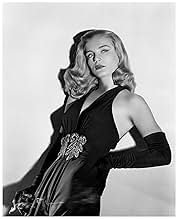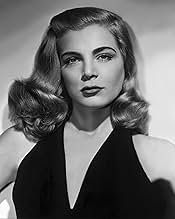Un soldado huye en lugar de recibir la Medalla de Honor, por lo que su amigo obtiene permiso para investigar, y el amor y la muerte pronto lo siguen.Un soldado huye en lugar de recibir la Medalla de Honor, por lo que su amigo obtiene permiso para investigar, y el amor y la muerte pronto lo siguen.Un soldado huye en lugar de recibir la Medalla de Honor, por lo que su amigo obtiene permiso para investigar, y el amor y la muerte pronto lo siguen.
- Dirección
- Guionistas
- Elenco
- Bellboy
- (sin créditos)
- Man
- (sin créditos)
- Mrs. Simpson - Lt. Col. Simpson's Wife
- (sin créditos)
- Mabel
- (sin créditos)
- Croupier
- (sin créditos)
- Dealer
- (sin créditos)
- Room Service Waiter
- (sin créditos)
- Priest
- (sin créditos)
Opiniones destacadas
If there's a problem it probably lies in the over-egged script and the purple prose, courtesy of no less than five writers and that includes producer Sidney Biddell who came up with the original story. Bogart is excellent as always and there's nice work from Morris Carnovsky as a bad guy but Lizabeth Scott was certainly no Mary Astor and at times you wonder if her 'bad acting' is bad acting or just 'bad acting', if you get my drift. For some reason the film isn't much seen these days which is a pity because, while no classic, it really is a lot of fun.
"Dead Reckoning" is a film that is satisfying while one is watching it, but later on, in retrospect, we question a lot of what we have seen as the plot doesn't make sense in many ways. All the elements of the Film Noir genre can be found in it. We have a war hero Rip, who is investigating the disappearance of his buddy, who he watches running away from a train in order not to testify with him in Washington. The action takes us to a Southern coastal town, where supposedly, the escapee has gone to. Little prepares Rip to find his friend burned to death in the morgue.
Thus begins a tale of deception that has lots of interesting twists. The film benefits from its two stars, who play a game that on the surface seems to be one thing, and with a surprising twist at the end, turns out to be something else.
Humphrey Bogart excelled in movies like this. He is tough, but he has time to have a great rapport with Dusty, the former singer at the local night club. Lisabeth Scott plays the siren with an air of mystery. It comes as a big surprise what happens at the end.
Morris Carnovsky, a great theater actor of the time, is Martinelli, the crooked owner of the night club. Also a young William Prince plays the man who ran away to find a tragic fate by doing so.
This kind of thriller, which now falls under the general rubric of film noir, was losing a little steam by this time. For one thing, Morris Carnovksy's character of Martinelli had been done to death in the previous five years by everyone from Sydney Greenstreet to Otto Kruger. Marvin Miller's hulking, seemingly emotionally disturbed thug had become a commonplace fixture in such films; and while Miller is unique in his heavy-set, Orson Wellesian appearance, there's little that's new here, either. One can imagine script conferences of the day, with young screenwriters falling over one another trying to come up with a new psychological "complex" for the bad guy to be suffering from. Fortunately for the viewer, cliched though this movie is, it was made with extreme professionalism. Leo Tover's cinematography is understated, and nicely suggests the equatorial. John Cromwell was an old stage and movie pro by this time, though his usual magical touch with actors failed him with Miss Scott, he handles the tough guy stuff with suave authority.
¿Sabías que…?
- TriviaThe film was originally intended by Columbia Pictures' production chief Harry Cohn as a vehicle for Rita Hayworth, a follow-up to the extremely popular Gilda (1946). Cohn thought that the pairing of Hayworth and Humphrey Bogart would be a guaranteed money maker. However, Hayworth was in the middle of a contract dispute with Columbia, and refused to make the film, so she was replaced by Lizabeth Scott, who was borrowed from Paramount Pictures' producer Hal B. Wallis.
- ErroresRip is severely beaten by the gun thug and has cuts near his eyebrow and on his cheek. When he goes to Coral's place, the injuries are still there. He's said to have slept 36 hours but, after waking and shaving, there's no sign of the wounds.
- Citas
Rip Murdock: You know, the trouble with women is they ask too many questions. They should spend all their time just being beautiful.
Coral Chandler: And let the men do the worrying.
Rip Murdock: Yeah. You know, I've been thinking: women ought to come capsule-sized, about four inches high. When a man goes out of an evening, he just puts her in his pocket and takes her along with him, and that way he knows exactly where she is. He gets to his favorite restaurant, he puts her on the table and lets her run around among the coffee cups while he swaps a few lies with his pals...
Coral Chandler: Why...
Rip Murdock: Without danger of interruption. And when it comes that time of the evening when he wants her full-sized and beautiful, he just waves his hand and there she is, full-sized.
Coral Chandler: Why, that's the most conceited statement I've ever heard.
Rip Murdock: But if she starts to interrupt, he just shrinks her back to pocket-size and puts her away.
Coral Chandler: I understand. What you're saying is: women are made to be loved.
Rip Murdock: Is THAT what I'm saying?
Coral Chandler: Yes, it's a confession. A woman may drive you out of your mind, but you wouldn't trust her, and because you couldn't put her in your pocket, you get all mixed up.
- ConexionesEdited into Esto es todo (2009)
- Bandas sonorasEither It's Love or It Isn't
By Allan Roberts and Doris Fisher
Performed by Trudy Stevens (uncredited)
[Coral (Lizabeth Scott) sings the song at the nightclub while she's seated with Rip]
Selecciones populares
- How long is Dead Reckoning?Con tecnología de Alexa
Detalles
- Fecha de lanzamiento
- País de origen
- Idiomas
- También se conoce como
- Dead Reckoning
- Locaciones de filmación
- San Petersburgo, Florida, Estados Unidos(Rip and Johnny on Central Avenue)
- Productora
- Ver más créditos de la compañía en IMDbPro
Taquilla
- Total a nivel mundial
- USD 84
- Tiempo de ejecución1 hora 40 minutos
- Color
- Relación de aspecto
- 1.37 : 1






































